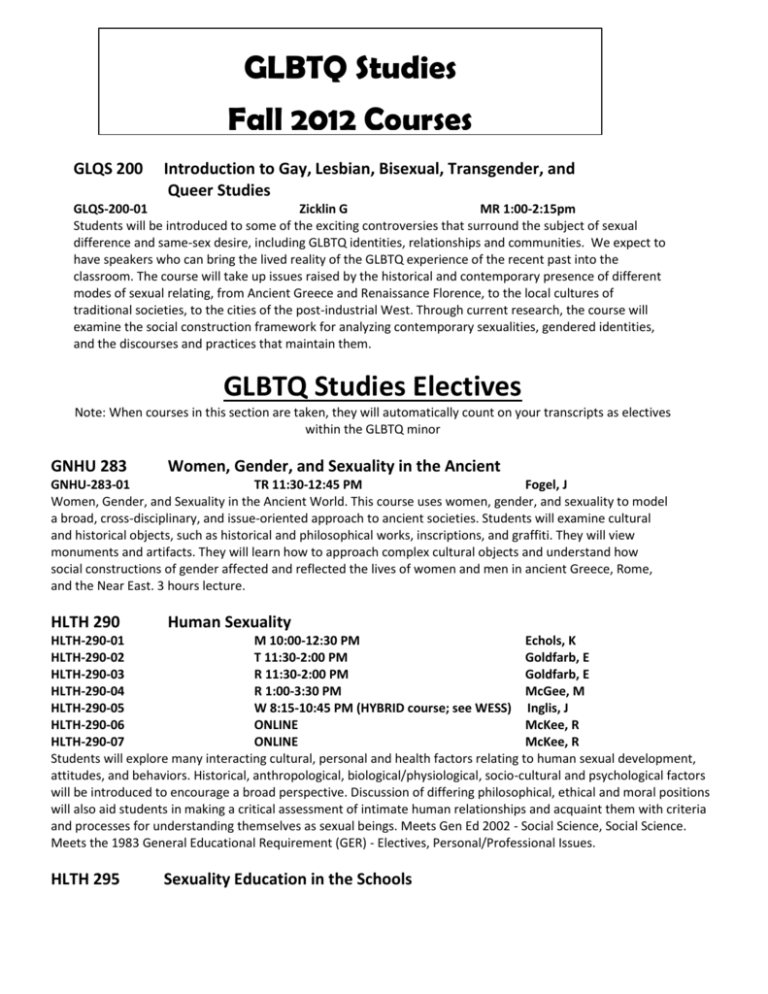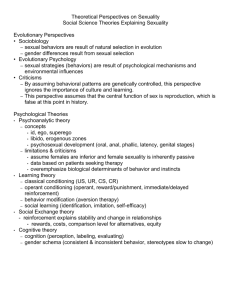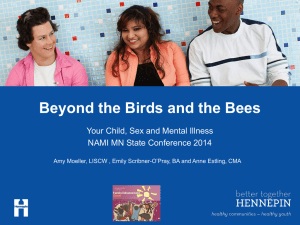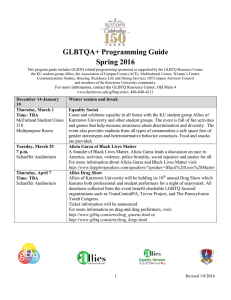
GLBTQ Studies
Fall 2012 Courses
GLQS 200
Introduction to Gay, Lesbian, Bisexual, Transgender, and
Queer Studies
GLQS-200-01
Zicklin G
MR 1:00-2:15pm
Students will be introduced to some of the exciting controversies that surround the subject of sexual
difference and same-sex desire, including GLBTQ identities, relationships and communities. We expect to
have speakers who can bring the lived reality of the GLBTQ experience of the recent past into the
classroom. The course will take up issues raised by the historical and contemporary presence of different
modes of sexual relating, from Ancient Greece and Renaissance Florence, to the local cultures of
traditional societies, to the cities of the post-industrial West. Through current research, the course will
examine the social construction framework for analyzing contemporary sexualities, gendered identities,
and the discourses and practices that maintain them.
GLBTQ Studies Electives
Note: When courses in this section are taken, they will automatically count on your transcripts as electives
within the GLBTQ minor
GNHU 283
Women, Gender, and Sexuality in the Ancient
GNHU-283-01
TR 11:30-12:45 PM
Fogel, J
Women, Gender, and Sexuality in the Ancient World. This course uses women, gender, and sexuality to model
a broad, cross-disciplinary, and issue-oriented approach to ancient societies. Students will examine cultural
and historical objects, such as historical and philosophical works, inscriptions, and graffiti. They will view
monuments and artifacts. They will learn how to approach complex cultural objects and understand how
social constructions of gender affected and reflected the lives of women and men in ancient Greece, Rome,
and the Near East. 3 hours lecture.
HLTH 290
Human Sexuality
HLTH-290-01
M 10:00-12:30 PM
Echols, K
HLTH-290-02
T 11:30-2:00 PM
Goldfarb, E
HLTH-290-03
R 11:30-2:00 PM
Goldfarb, E
HLTH-290-04
R 1:00-3:30 PM
McGee, M
HLTH-290-05
W 8:15-10:45 PM (HYBRID course; see WESS) Inglis, J
HLTH-290-06
ONLINE
McKee, R
HLTH-290-07
ONLINE
McKee, R
Students will explore many interacting cultural, personal and health factors relating to human sexual development,
attitudes, and behaviors. Historical, anthropological, biological/physiological, socio-cultural and psychological factors
will be introduced to encourage a broad perspective. Discussion of differing philosophical, ethical and moral positions
will also aid students in making a critical assessment of intimate human relationships and acquaint them with criteria
and processes for understanding themselves as sexual beings. Meets Gen Ed 2002 - Social Science, Social Science.
Meets the 1983 General Educational Requirement (GER) - Electives, Personal/Professional Issues.
HLTH 295
Sexuality Education in the Schools
HLTH- 295-01
F 8:30-11:00 AM
Velasco, J
HLTH -295-02
F 2:30-5:00 PM
Velasco, J
This course combines direct sexuality content with teaching methodology for communicating this content accurately
and effectively to students in a school-based setting. A focus will be placed on child and adolescent development to
ensure that students understand the type of sexuality-related information that
is appropriate at different age and development levels. It will also explore important issues within schools that have an
impact on how sexuality education gets taught. It will use both the New Jersey Core
Curriculum Content Standards (CCCS) and the SIECUS National Guidelines Task Force’s Guidelines for Comprehensive
Sexuality Education Kindergarten – 12th Grade. There are no prerequisites for this course.
PSYC 227
Psychological Aspects of Human Sexuality
PSYC-227-01
ONLINE
Sexton, B
Topics include: Behavior and attitudes influenced by basic sexuality; widening perspectives to
aid in decision-making; developmental periods and sexual relationships; connections between
psychological theory and sexual mores; genetic understandings.
SOCI 430
Sociology of Gender
SOCI-430-01
M 1:00-2:15 PM and online (HYBRID course) Besen, Y
In this course, we will examine how our society builds social meaning around the physical categories of female
and male. Gender is the social construction of one’s sex; that is, how we think, how we speak, how we are
socialized, what resources are available to us, what respect we are given, are all influenced by the societal
meanings given to being physically identified as male or female. We must realize that gender intersects with
other social factors such as class and race. So in understanding gender, we have to answer the questions,
“Which woman?” Which man?” Prerequisites: One course in Sociology or department approval.
Selected Topics Courses Counting As
GLBTQ Electives:
Note: The list below is made up of Selected Topics courses in other departments. Only if the material in a
Selected Topics course explicitly deals with issues of gender/sexuality (such as those listed here), it may
count as an elective for the GLBTQ minor. In order for this to show up in a students’ transcript, a credit
adjustment form must be filled out during enrollment or after completion of the course. Please see the
GLBTQ Program Coordinator for signature on the form.
SOCI 411 Selected Topics in Sociology: Gender In The Media
SOCI- 411-01
M 5:30-8:00 PM
Keller, K
Who we are – what we think others are - is influenced by the media that surrounds us. We are bombarded
by images of what women and men look like and should act like every time we look at advertisement in a
magazine, watch a video, listen to a song, play a video game, watch a film, read a book or a blog. Come
join us in an exploration of how media influences and shapes our perceptions of gender. Become “media
literate “by learning to analyze the gender messages that are embedded in media. TV shows, films, music
videos, advertisements, the internet will be our sources to which we apply theories of gender and
intersectional social factors like race, class and sexual orientation.
Please check the WESS listings in affiliated departments for the most accurate and
up-to-date listings of GLBTQ Studies elective courses and their times/days.












